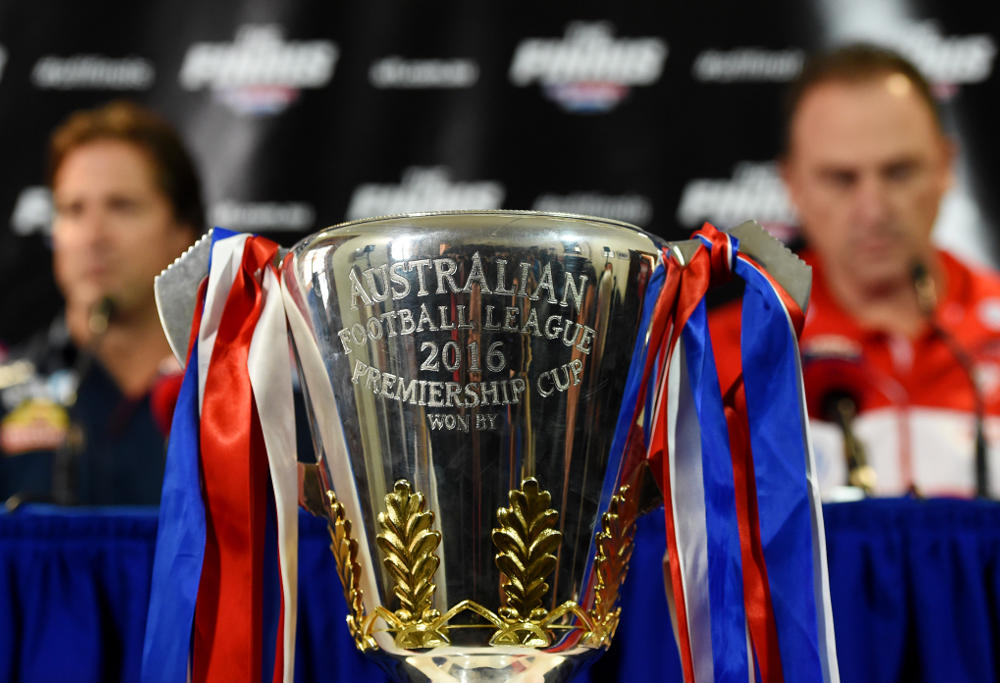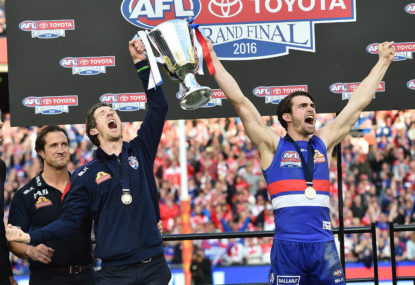I should start by saying this is not a situation where everyone’s a winner or gets a medal.
In fact, I’m quite proud of the fact that in Australia we impose such a high standard on who exactly receives acknowledgement on a successful Premiership team.
For context, in sports around the world, the governing body leaves it to the winning team’s discretion to award and recognise whomever and how ever many they want within their organisation. But every system has its flaws and ours does not allow for enough nuance.
Imagine the scenario where a player plays every minute of every game of the season but is injured in the last quarter of the prelim final and cannot take the field on grand final Day. Can it be argued that person has not done enough, in working their backside off through the season towards getting their team to a position where it can win the ultimate, to receive a Premiership medallion should the team triumph on the day?
Some would argue no; for the player did not take the field on grand final day and thus played no part in the helping the team win on the day.
Ok – but I would argue a possible alternative scenario where a player starts the game, is injured in the first five minutes and is taken off the field to not return before they can register a statistic of any kind. The team then goes on to win the game in that player’s absence.
Does it not become acceptable for the player to accept the medal now given that the player in question, did not play any part on-field in helping the team win on the day?
We all know that the success on the final day of the season is the culmination of a lot of work right through the year by many bodies and perhaps for many years beforehand. But only 22 can take the field on the day.
The structure I’m proposing for a player who missed a winning grand final in a particular year, either due to injury, suspension or other personal circumstance, to be eligible for a medal and official recognition as an AFL premiership player is.
1. Player must play a minimum of 15 games during that year’s home-and-away season.
2. Player must in addition to the 15 games, play at least one finals match during that season.
3. Or player needs to play a minimum of 16 games during the season including at least one final as this will allow combos of 14 regular season two finals, or two and three finals.
This sets a high threshold of contribution to the team’s cause over the season to qualify. There aren’t many players in the AFL that would qualify under this system each year.
Lin Jong and Matt Suckling would have qualified for the Bulldogs 2016 Flag. As would Ben McGlynn and Daniel Menzel for Sydney and Geelong’s 2012 and 2011 premierships respectively which both players missed after being injured during games in September after being mainstays in for their sides during the rest of the season.
But on occasions such as Essendon’s 2000 premiership, or Collingwood’s 2010 win, no player outside of those who played in the actual grand finals would have qualified under the 15+1 system.

(AAP Image/Tracey Nearmy)
Presentations
Some eligible players may outright refuse a premiership medal for not playing a grand final.
That’s an absolutely valid individual decision and is that particular player’s right to make for their own reasons whatever they may be.
My idea proposes that the AFL recognises the player in question, if eligible, in the records books as a premiership player. If the player refuses to accept the medal, it is held in the AFL’s safekeeping should the player ever have a change of heart at any point down the track. If the player passes on before claiming it, then the right to claim the medal is passed on to their next of kin and can be stipulated in the deceased player’s will.
I would then leave it up to the individual eligible players who miss out on a grand final win, their teammates who play on the day and their respective clubs as the three parties to work out between themselves how to handle the situation and not bind their decision to an AFL decree.
The eligible players who wish to receive a medal could in theory.
1. Receive it on the dais immediately after the game along with their playing teammates and step to the sidelines
2. Receive it on the dais immediately after the game along with their playing teammates and join them on the dais as the premiership cup is presented and photos are taken
3. Be presented with their individual medals in the rooms after
There are any number of ways this can be handled by the players and clubs but the key here is to remember that the players are the focus as the major stakeholders in this and any individual player’s decision should be respected without the pressure of conformity.
Opportunities
The league’s administration made the decision to retrospectively award Brownlow medals to players who had tied with the winner in the past but lost on countback in the 1980’s. A decision that is widely accepted as the right thing to do.
This retrospective measure can be applied to any players who missed out on a premiership in the past. 15 out of 22 Home-and-away games is 68 per cent (more than the two-thirds requirement)
Since 1897 the home-and-away season has comprised 12, 14, 15, 16, 17, 18, 19, 20 and 22 games depending on what number of teams were available and the format. Applying the 68 per cent weighting to them we get 8, 9, 10, 11, 12, 12, 13, 14 and 15 as the cut off requirement of games needed to play to be designated a premiership player, plus 1 of which as least one must be a finals game.
As we discover which players have fulfilled these criteria since 1897, we can perhaps draw attention to some forgotten players of the past who paved the way for what the players and fans of 2017 can enjoy today as well as honour our game’s rich history and stories.
An opportunity also exists for the clubs to select and reward some supporters of the club such as a sick child or a person who’s had very difficult circumstances during the year to come out on grand final day and present the medal to an eligible player, outside the 22 Auskickers who will present to the playing 22.
Imagine the joy and anticipation that can be bought to these supporters by being afforded such an opportunity. Our game’s greatest asset is the social glue it provides us and this is another opportunity to exercise it.
Too often I feel that it is endemic human nature to look solely at the end result and designate something as a success or failure without really understanding what it takes to get there. Perhaps if this or a version of, comes into effect we may be in a better position to acknowledge that it takes many contributions to achieve success.
If nothing else, this may be a long shot to possibly bringing to an end the 24-year running rift between Derek Kickett and Kevin Sheedy, and isn’t that a noble goal in itself?































































































